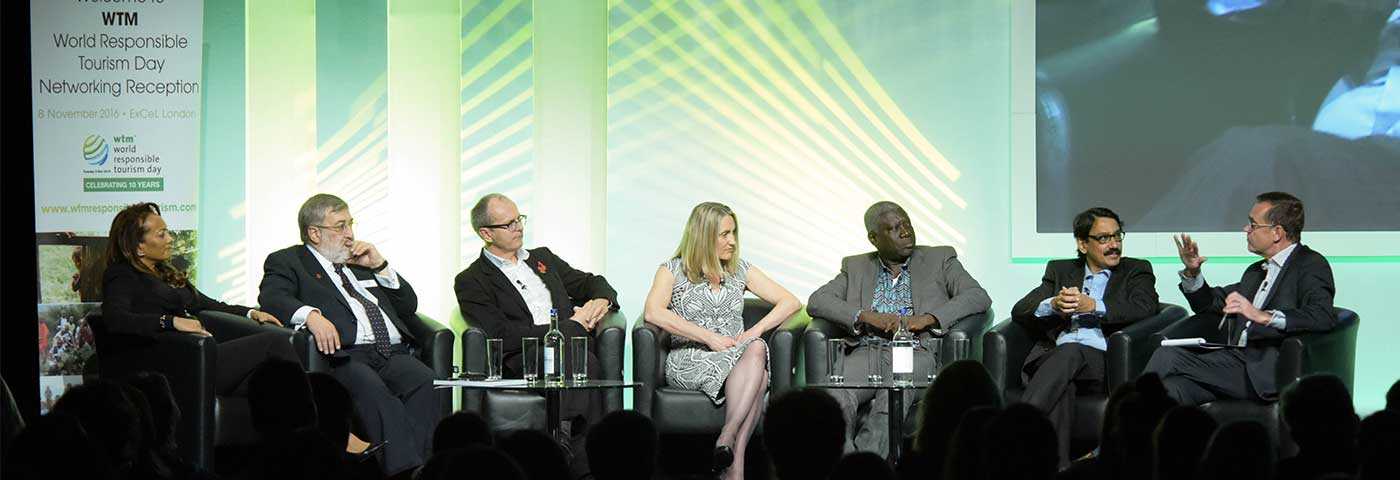I spent the whole of World Travel Market sat in the lecture halls, listening to the women and men most committed to developing sustainable tourism discuss the greatest challenges as they saw them. Many of their words have stayed with me, as together they represent a wide range of the challenges facing us as we develop a more sustainable tourism industry. With only a few weeks, therefore, until 2017 and the start of the UN’s International Year of Sustainable Tourism for Development, I thought I would share the key thoughts buzzing around me.
1 – Will destinations deal with issues around overcrowding and dissatisfaction among locals?
WTM’s Responsible Tourism Advisor Harold Goodwin said that: “Overtourism is very much the issue of the moment… the challenge is that people from destinations are downstairs selling, while those upstairs discussing the issues are from other parts of the industry.” Will we make this connection better in 2017?
2 – Will Governments lead the way or wait on companies?
If destinations want to promote themselves as sustainable, argued Professor Xavier Font, they need to put their money where their mouth is and commit to only support sustainable purchasing. “Until government is prepared to lead on its purchasing decisions, why should it expect others to do the same,” he argued.
3 – Will governments make companies ensure community wellbeing?
Adama Bah argued that since destinations continue to spend on promoting the travel industry they should represent their citizens better and demanding it ensures the wellbeing of the communities tourism affects. “Why should government spend the money, basically subsidising the companies and gaining nothing in return?” he asked. “Communities are paying taxes into government and they are not getting the industry they want.”
4 – Can tourism save the wildlife that so many people travel around the world to see, and whose images grace our brochures and websites?
Dylan Walker, CEO of the World Cetacean Alliance, explained how the commercial advantages of keeping iconic animals from tigers to dolphins and great apes alive, saying: “Tourism has a huge responsibility of saving species from extinction. We might not be ready, but we have the opportunity.”
5: Can community tourism develop by promoting real life rather than add on attractions?
Rupesh Kumar, State Responsible Tourism Field Coordinator for Kerala, said communities looking to develop community-based tourism – and the companies that work with them – should be focussing on showcasing activites that are the core part of the villagers’ livelihoods – such as farming – rather than “adding on dedicated and additional tourism experiences such as tiger tours and elephant tourism.”
6: Can industry promote ‘authentic’ tourism as being what is really happening rather than what tourists want to see?
Picking up on the theme from 7, Glynn O Leary from Transfrontier Parks Destinations, asked: “How do we explain to guests wanting to see how Bushmen lived 100 years ago explain that they have arrived 100 years too late?”
7 – Will industry learn how to communicate the benefits of sustainable tourism to consumers?
With a company like Responsibletravel.com saying at the show that only 10% of visitors to its site come looking for responsible tourism, how will companies persuade consumers to look for such experiences? Jane Ashton, Director of Sustainable Development, TUI Group, said the industry needs to keep working to persuade consumers that sustainable tourism makes for better holiday experiences. “We have a long way to go to find the language to raise the demand among customers,” said Ashton. “We have been hesitant because we were worried about greenwash, and now perhaps we are risking so-called ‘greenhush’ and not talking about it enough.”
8 – Will responsible tourism communication become the norm?
All of these challenges are drawn together in this last one. Tim Williamson fromResponsibleTravel.com said that in an age of transparency driven by social media and online reviews, we can no longer gloss over what is really going on on the ground. He urged the audience: “we need to sell on trust, rather than create a false world of paradise and assume the customer will believe us.”


Should we not as well highlight the difficulties for guests to find sustainable hotels and understand what hotels are practically doing to be sustainable. Hotels are then encouraged to accomplish best green practices for the pleasure of their guests.